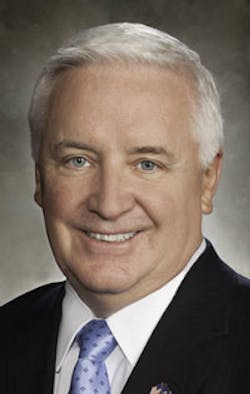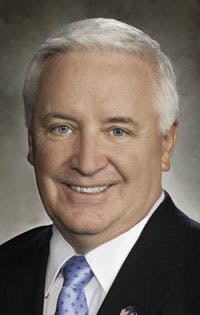Pennsylvania governor proposes Marcellus shale policy
Pennsylvania Gov. Tom Corbett proposed legislation and state policy related to drilling and development of Marcellus shale natural gas, including increasing the gas well setback distance from private water wells and public water systems.
"We are going to do this safely and we're going to do it right, because energy equals jobs," Corbett said from Pittsburgh on Oct. 3.
The Marcellus play is Devonian black shale covering an estimated 95,000 sq miles and stretching across several states, including Pennsylvania (OGJ, Aug. 1, 2011, p. 30).
Earlier this year, the Marcellus Shale Advisory Commission appointed by Corbett issued 96 recommendations. About one-third require legislative changes, and more than 50 can be accomplished within the state agencies.
Corbett said he will soon submit his drilling proposals to the legislative leadership, and he instructed state regulators to recommend policy implementation plans within 30 days.
Specifically, Corbett proposed:
• Increasing the well setback distance from private water wells to 500 ft from the current 200 ft, and to 1,000 ft from public water systems. Increasing the setback distance for wells near streams, rivers, ponds, and other bodies of water to 300 ft from 100 ft.
• Increasing well bonding to $10,000 from $2,000.
• Increasing blanket well bonds up to $250,000 from $25,000.
• Expanding an unconventional gas operator's "presumed liability" for impairing water quality to 2,500 ft from a gas well (currently 1,000 ft), and extending the duration of presumed liability to 12 months after well completion (currently 6 months).
• Enabling state regulators to take quicker action to revoke or withhold permits for operators who consistently violate rules.
• Doubling penalties for civil violations to $50,000.
• Doubling daily penalties to $2,000/day.
Impact fee adoption
The proposals call for counties, local governments, and state agencies to adopt an impact fee related to Marcellus shale drilling and development.
"Estimates show that this impact fee will bring in about $120 million in the first year, climbing to nearly $200 million within 6 years," Corbett said.
He outlined a formula on how to split the impact fee revenues among the county, municipalities that host drilling pads, and all municipalities within the county. The distribution formula will be based on population and highway miles.
Part of the fee revenues would be divided among various state agencies, with most of it to be allotted for road, bridge, rail, and other transportation infrastructure maintenance and repair within counties hosting Marcellus gas development.
Under this plan, counties and municipalities may use these funds on various gas development-associated expenses including water, storm water, and sewer system construction and repair.
Corbett's also proposed to help reduce US reliance on imported oil by developing "Green Corridors" for natural gas vehicles with refueling stations at least every 50 miles and within 2 miles of key highways. He also wants to amend a Clean Vehicles Program and outlines proposals to help schools and mass transit systems convert their fleets to natural gas.
More Oil & Gas Journal Current Issue Articles
More Oil & Gas Journal Archives Issue Articles
View Oil and Gas Articles on PennEnergy.com
About the Author
Paula Dittrick
Senior Staff Writer
Paula Dittrick has covered oil and gas from Houston for more than 20 years. Starting in May 2007, she developed a health, safety, and environment beat for Oil & Gas Journal. Dittrick is familiar with the industry’s financial aspects. She also monitors issues associated with carbon sequestration and renewable energy.
Dittrick joined OGJ in February 2001. Previously, she worked for Dow Jones and United Press International. She began writing about oil and gas as UPI’s West Texas bureau chief during the 1980s. She earned a Bachelor’s of Science degree in journalism from the University of Nebraska in 1974.


